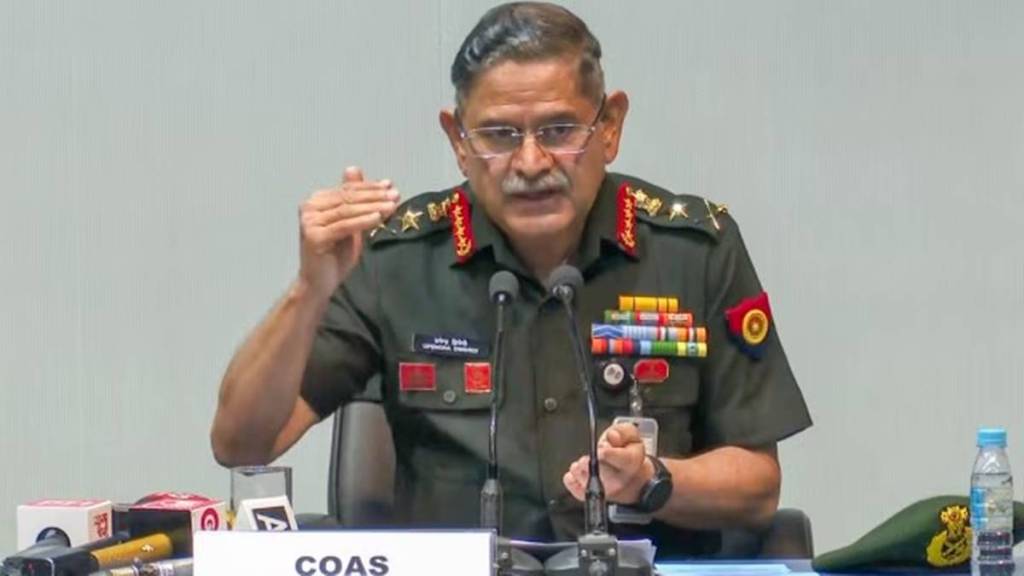Next week, General Upendra Dwivedi, the Chief of Army Staff (COAS) of India, will make an important official visit to Nepal. This visit is expected to deepen the longstanding military ties between India and Nepal, two nations that share not only a geographical boundary but also a history of strong cultural, political, and strategic cooperation. As both countries face common security challenges in the region, the visit represents a key moment in reinforcing their partnership and addressing shared concerns.
India and Nepal have maintained a special relationship over the years, largely due to their close proximity and cultural ties. This bond has extended to defence cooperation, with both nations collaborating extensively in military training, joint exercises, and strategic security concerns. General Dwivedi’s visit serves as a testament to the enduring strength of this military relationship and will likely pave the way for even greater cooperation in the future.
A Deepening Military Partnership
The India-Nepal military relationship has evolved over decades, driven by mutual strategic interests and a shared commitment to regional security. Over the years, India has played a pivotal role in supporting Nepal’s military modernization efforts. General Dwivedi’s visit will provide an opportunity to further cement this collaboration and discuss future areas of joint engagement. As one of the key components of the bilateral relationship, training exchanges between the two countries have flourished.
This year alone, more than 300 Nepali Army personnel have undergone specialized training in India in critical areas like counterinsurgency, peacekeeping, and leadership development. This training fosters interoperability between the two forces, ensuring that both are better equipped to face emerging security threats. Similarly, Indian military personnel have also benefited from similar opportunities in Nepal, which strengthens the operational ties between the two armies.
The visit is expected to focus on advancing these exchanges, ensuring that both sides continue to enhance their respective military capabilities. “General Dwivedi’s visit will focus on expanding the scope of our training programs and reinforcing our commitment to enhancing our mutual military capabilities,” stated a defence source. The continued professional exchanges are central to both nations’ military strategies, particularly as they work together to tackle regional security issues.
Joint Exercises and Defence Modernisation
A cornerstone of India-Nepal defence cooperation is the Surya Kiran joint military exercise, an annual event that brings together the two countries’ forces to work on counterterrorism operations, disaster relief efforts, and humanitarian assistance. The upcoming 18th edition of Surya Kiran, which will be held in Nepal in December 2024, will mark a significant milestone in this collaboration. The exercise will be expanded to include more complex operational scenarios, further improving the synergy between Indian and Nepali forces.
India has also provided Nepal with significant support in terms of military hardware, including small arms, vehicles, and advanced training simulators. This support plays an important role in enhancing Nepal’s military capabilities and helps the country meet its security needs. Additionally, the Bilateral Consultative Group on Security Issues (BCGSI) continues to serve as a vital platform for both sides to discuss and address emerging security challenges.
General Dwivedi’s visit is expected to underscore the importance of defence modernization, with a focus on expanding equipment and support to meet the evolving needs of both militaries. The visit will likely also include discussions on enhancing regional security cooperation, especially in light of global and local geopolitical shifts.
Cultural and Symbolic Ties
The visit of General Dwivedi is not just about formal military engagements; it also reinforces the deep cultural and symbolic ties between the two countries. A long-standing tradition in India-Nepal military diplomacy involves conferring the honorary rank of General to the Chiefs of Army Staff of each country. During his visit, General Dwivedi will be honoured with the title of General in the Nepali Army, a gesture that reaffirms the strong, symbolic bond between the two armies.
Another important aspect of the visit is the role of Indian ex-servicemen in Nepal. Over 88,000 veterans of the Indian Army reside in Nepal, where they continue to play an integral part in the country’s socio-economic development. Many of these veterans contribute to sectors such as education, healthcare, and rural development, helping to strengthen the people-to-people ties that bind India and Nepal. Their presence underscores the deep-rooted connections that go beyond the military realm.
Additionally, General Dwivedi is expected to visit the Shri Muktinath Temple, a revered site for many Indian military personnel. The visit is particularly symbolic in the context of honouring the late General Bipin Rawat, India’s first Chief of Defence Staff, who had planned a visit to the temple before his tragic passing in 2021. In his memory, a bell, named ‘Bipin Bell’, was installed at the temple in 2023, marking the close ties between the two countries.
Strategic Importance of the Visit
General Dwivedi’s visit comes at a critical time when both India and Nepal are looking to expand their defence cooperation, particularly in light of increasing security concerns in South Asia. The visit serves as a reminder of the importance of a strong India-Nepal partnership, both in terms of security and stability. As neighbouring countries with shared strategic interests, continued collaboration in military matters is essential for ensuring peace in the region.
“This visit represents a significant moment in our ongoing efforts to enhance the military relationship between India and Nepal. It is a chance for both sides to discuss future challenges and opportunities for deeper cooperation,” said the source quoted above.
By reinforcing these ties through continued military exchanges, joint exercises, and mutual defence support, India and Nepal are well-positioned to address the challenges of the 21st century. As both nations work to ensure a secure and stable South Asia, General Dwivedi’s visit will undoubtedly play a key role in further strengthening the defence and security cooperation that lies at the heart of this vital bilateral relationship.


